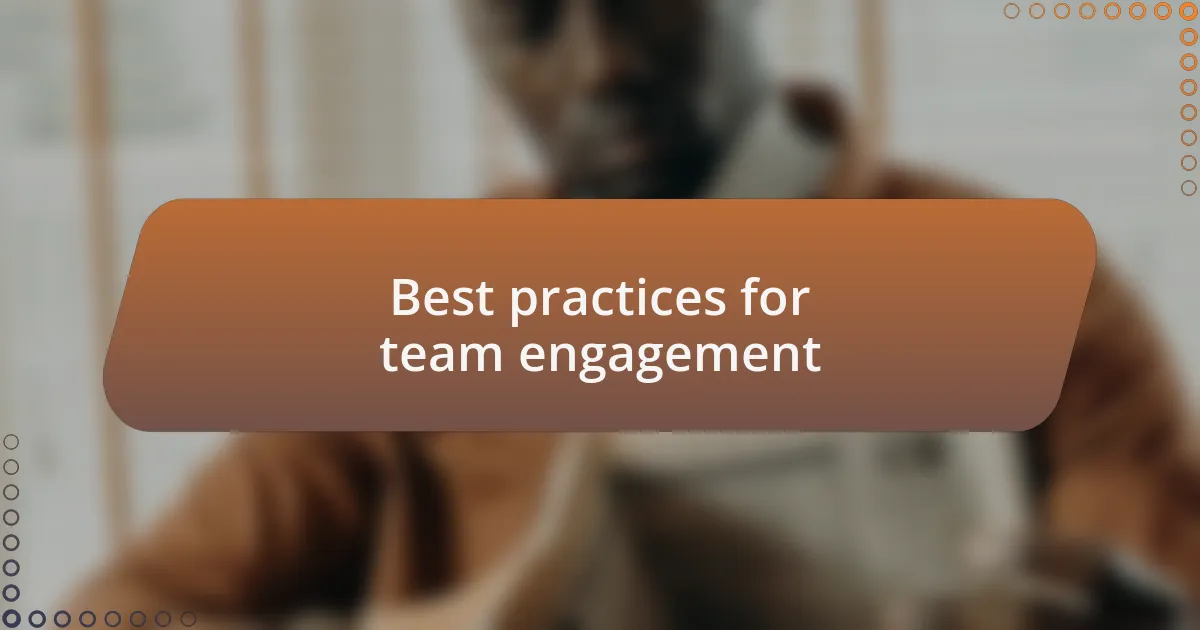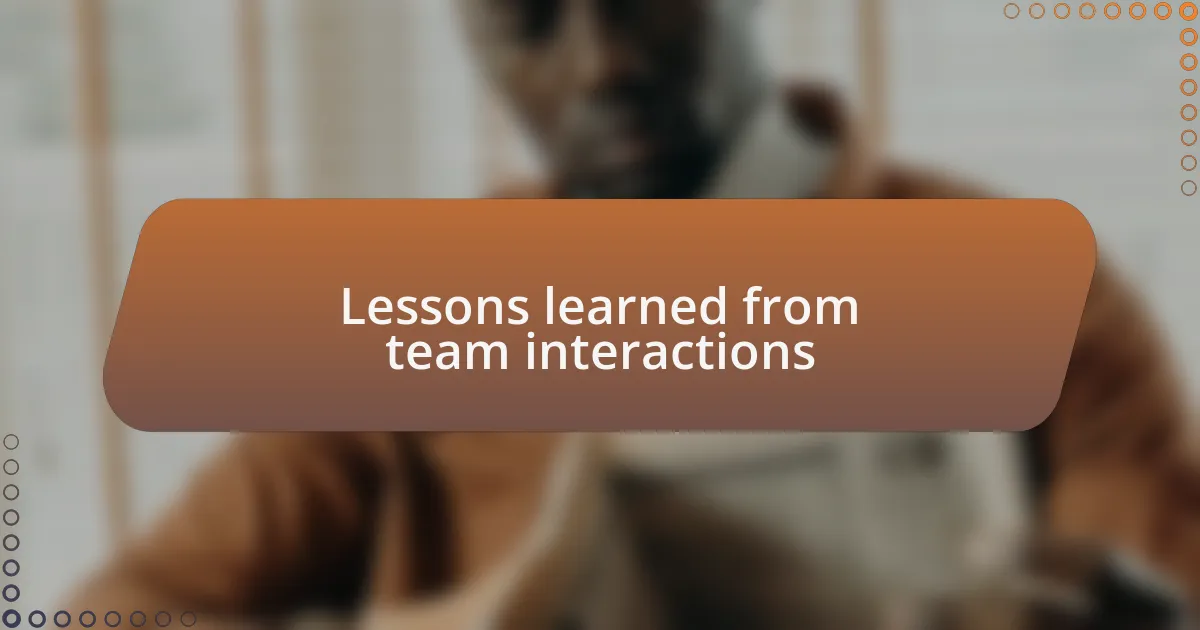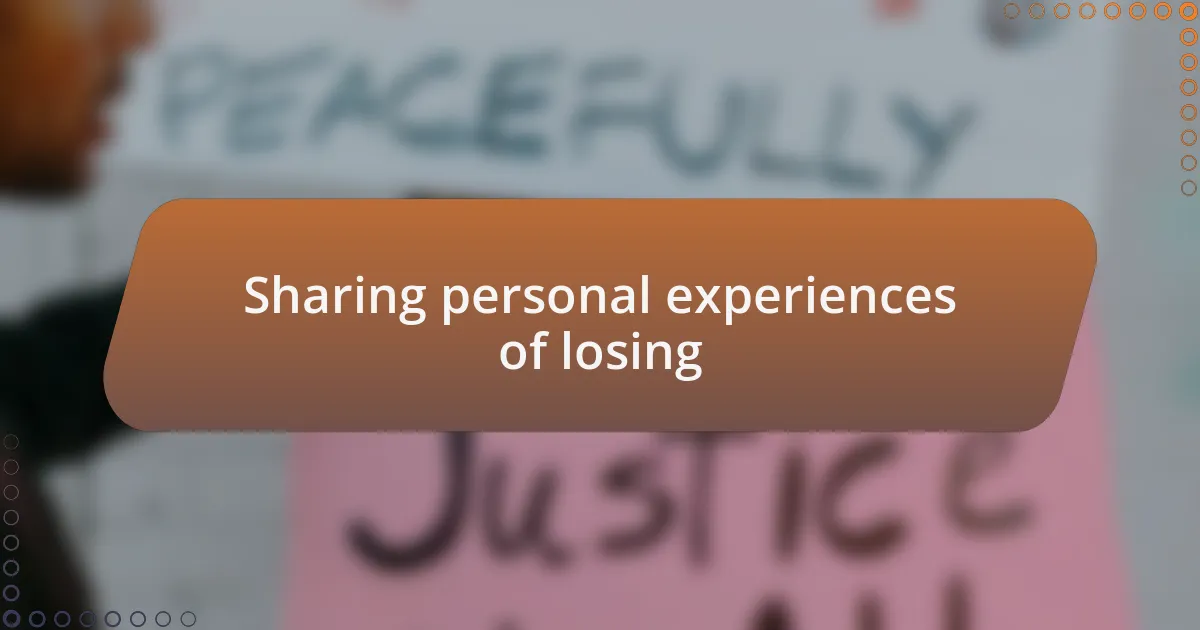What works for me in team dynamics 22 May 7:50 AM (5 months ago)
Key takeaways:
- Open and effective communication is essential for team cohesion and creativity in newsrooms.
- Cultural influences and values, such as “Bayanihan,” shape teamwork and storytelling in Filipino newsrooms.
- Fostering collaboration through mentorship, brainstorming, and regular feedback enhances team dynamics and morale.
- Recognizing individual contributions and celebrating small wins significantly boosts team motivation and engagement.

Understanding team dynamics in news
In the fast-paced world of news, understanding team dynamics is crucial. I remember my early days working with a diverse group of journalists. We each brought unique perspectives, and it was fascinating to see how our different backgrounds influenced our storytelling. When I think back, I realize it was our ability to communicate openly that transformed our differences into strengths.
Team dynamics in newsrooms often reflect a balance of creativity and structure. Have you ever noticed how some team members thrive under pressure while others prefer a more measured approach? I’ve experienced it firsthand—those moments when we had tight deadlines, and the energy surged, creating an atmosphere of camaraderie. It taught me that knowing each team member’s strengths can significantly enhance our collective output.
Moreover, emotional intelligence plays a significant role in how we collaborate. I recall a time when a teammate was going through a tough personal issue. Instead of charging ahead with our tasks, we paused to support her, which ultimately strengthened our bond. This experience made it clear to me that understanding and empathizing with one another can foster a more resilient and united team in the ever-demanding landscape of news.

Importance of effective communication
Effective communication is the backbone of any successful team, especially in a newsroom setting. I vividly recall a time when a simple miscommunication almost derailed a major story. We were all so focused on our individual tasks that we forgot to check in with one another. It was a stark reminder that clarity and continuous dialogue are essential for aligning our efforts and ensuring everyone is on the same page.
When team members communicate well, it creates an environment of trust and respect. I once worked with a group where open feedback was encouraged, and it made a world of difference. Because we felt safe expressing our views, we were more willing to take creative risks, leading to some of our most engaging stories. Isn’t it amazing how effective communication can unlock potential that might otherwise go unnoticed?
On the other hand, poor communication can lead to frustration and missed opportunities. I’ve seen how a lack of information can leave team members feeling isolated or anxious. Once, during a hectic news cycle, we experienced a near-miss with a significant event simply because critical updates weren’t shared in real time. That experience reinforced my belief that being proactive in communication isn’t just important—it’s vital for keeping the team cohesive and our stories compelling.

Cultural influences in Filipino newsrooms
In Filipino newsrooms, cultural influences play a significant role in shaping narratives and approaches to storytelling. I remember covering a local festival where the joy of the community was palpable, and it made me realize how cultural traditions enrich our reports. It’s fascinating how cultural nuances can guide the tone of a story, transforming a simple news piece into a vibrant tapestry of shared experiences.
Moreover, the Filipino value of “Bayanihan,” or community collaboration, often shifts how news teams operate. I noticed that during a particularly challenging news cycle, team members instinctively rallied around one another, lending support and expertise. This collective spirit not only fosters camaraderie but also enhances the depth of our coverage—did you ever think about how the heart of the story can often be found in how we, as a team, come together to tell it?
Additionally, the significance of respect for elders and hierarchy in Filipino culture can influence newsroom dynamics. I recall how discussions often shifted in tone when our senior editors offered insights, and their experiences brought a wealth of knowledge to our evolving stories. Sometimes, I wonder if this respect enhances our work by grounding us in a historical context, reminding us that every story we tell is interwoven with the fabric of our collective past.

Strategies for fostering collaboration
One effective strategy for fostering collaboration in a newsroom is creating a shared space for brainstorming. I once participated in a session where every team member’s idea was welcomed, no matter how unconventional. It felt liberating to voice thoughts without judgment, sparking innovative ideas that transformed our stories. Have you ever been in a situation where an open forum led to unexpected creativity? I find that it often leads to solutions that we might never have considered otherwise.
Another key approach is to encourage mentorship within the team. I’ve experienced firsthand how pairing less experienced reporters with veterans can enhance skills and build trust. During my early days in journalism, guidance from a seasoned colleague not only refined my writing but also instilled in me the significance of collaboration. This practice not only fosters knowledge sharing but also reinforces a sense of belonging. How do you think mentorship could change the atmosphere in your workplace?
Regular feedback loops also play a pivotal role in nurturing collaboration. One time, we implemented a system where we would exchange constructive feedback weekly. It became a cornerstone in our team dynamic. I recall receiving insights that helped me grow, while also learning to appreciate others’ strengths. It’s amazing how continuous feedback creates a culture of improvement and support. What would the atmosphere in your team look like if feedback was a natural part of your routine?

Personal experiences in team settings
In my experience, the way team members communicate can significantly influence dynamics. I once worked on a project where we established informal check-ins to discuss not only progress but personal challenges too. This openness fostered a deeper understanding among us, creating a bond that made collaboration feel much more enjoyable. Have you ever noticed how sharing personal stories can change the energy in a group?
I vividly remember a time when a team conflict arose due to miscommunication. Instead of letting it fester, we decided to hold a session dedicated to addressing our concerns. This realignment was eye-opening; we each gained insight into one another’s perspectives. It made me realize that a simple conversation can clear up misunderstandings and pave the way for stronger teamwork. How often does your team prioritize resolving conflicts early on?
Celebrating small wins can also make a huge difference in team morale. I recall a project where we set tiny milestones, and when we reached each one, we made it a point to celebrate together, whether with a lunch or an announcement in the office. It built a supportive atmosphere and motivated us to push harder towards our bigger goals. Have you ever celebrated your team’s achievements, no matter how minor they seemed?

Best practices for team engagement
Encouraging open feedback can dramatically enhance team engagement. In one of my past teams, we implemented an anonymous feedback system after our weekly meetings. To my surprise, this brought out honest opinions that often went unspoken. It felt empowering to know that my thoughts mattered, and it encouraged others to speak up too. Have you ever felt more comfortable sharing your ideas when there’s an element of anonymity?
Creating a sense of ownership within the team is also vital. I once led a small project where I assigned each member a specific aspect of the work to oversee, allowing them to take full responsibility. The energy shifted overnight; everyone was motivated and invested in the outcome. Seeing their pride in their work made me realize how accountability can boost overall team engagement. What steps do you take to empower your team members?
Lastly, incorporating team-building activities into our schedule can transform group dynamics. I organized a friendly trivia competition during a particularly busy period, and the laughter and friendly rivalry lifted everyone’s spirits. That day, I witnessed how a little fun can rejuvenate even the most stressed-out team members. When was the last time you brought some light-heartedness into your work environment?

Lessons learned from team interactions
Engaging in conversations with team members has taught me that listening is just as important as sharing ideas. In one instance, during a brainstorming session, I noticed how one quiet colleague had brilliant suggestions that only emerged when I prompted them directly. This experience underscored for me the significance of inclusivity in discussions—how often do we overlook the silent voices in our teams?
Another lesson I’ve learned is the impact of vulnerability in teamwork. I recall a project where I openly shared my struggles with a particular task, and unexpectedly, others followed suit. The result was a shared space where we could collectively address challenges, transforming our dynamic into one of support and cooperation. Have you ever thought about how openness can shape the trust within your team?
Lastly, I’ve realized that recognizing each individual’s contribution is crucial for team morale. During a challenging project, I made it a habit to highlight achievements—big and small—during our check-ins. It was stunning to see how gratitude fueled motivation and camaraderie among us. Have you ever taken a moment to celebrate the small wins in your team?
What works for me in sports nutrition 22 May 5:49 AM (5 months ago)
Key takeaways:
- Proper nutrition is essential for enhancing athletic performance, impacting energy levels, focus, and recovery.
- Meal timing, hydration, and individualized nutrition plans significantly influence training outcomes and overall performance.
- Incorporating whole foods, such as whole grains, fruits, vegetables, and lean proteins, boosts energy levels and accelerates recovery.
- Meal prepping and batch cooking streamline maintaining a nutritious diet, ensuring healthy options are readily available.

Understanding sports nutrition
When I first delved into sports nutrition, it felt like opening a treasure chest of knowledge. I quickly learned that fueling the body is just as essential as the training itself. Have you ever noticed how much energy you have or lack, depending on what you eat? That realization reshaped my approach to my workouts.
One of the most eye-opening moments for me came during a high-intensity training session. I underestimated the importance of hydration and performance-enhancing foods. I remember struggling midway, yearning for a snack that could lift my spirits and vigor. It made me understand that the right balance of carbohydrates, proteins, and fats is crucial—not just for athletes, but for anyone looking to optimize their physical activity.
Digging deeper into sports nutrition unveiled the relationship between diet and recovery. I used to dismiss the idea of post-workout meals, thinking they were just an afterthought. But after experiencing the difference a well-timed protein shake made, I can attest that proper nutrition aids in muscle recovery and growth. It’s fascinating how food can either hold you back or propel you forward in your sports journey. What have you discovered about your body’s needs during and after exercise?

Importance of nutrition for athletes
Nutrition plays a pivotal role in an athlete’s performance. I vividly recall a time when my pre-game meal consisted of a greasy burger and fries. The sluggish feeling that followed made it painfully clear that what we consume directly impacts our energy levels and focus. Have you ever felt that heavy sensation in your stomach that makes you question your food choices? It’s a real struggle that can hinder athletic performance.
The macronutrient balance is another key area I’ve learned about through experience. A few months back, I experimented with my protein intake before training sessions and noted a significant increase in my endurance. Carbohydrates provide quick energy, while proteins aid in repair and recovery. Ever tried a high-carb meal before an important workout? It’s a game-changer; I noticed I felt much stronger and could push myself further.
I also can’t overlook the mental aspect of nutrition. There was a point when I disregarded meal prepping, thinking I could grab something quick and nutritious on the go. But the moments I took to plan ahead kept me focused and less stressed. Have you ever noticed how a properly fueled body contributes to a clearer mind? It’s incredible how nutrition shapes not just physical performance but mental resilience as well.

Common dietary practices in sports
Common dietary practices in sports often center around timing and quality of meals. I remember during my training, I would set alarms to ensure I consumed a balanced meal two hours before exercise. This practice not only helped me optimize my energy levels but also prevented those dreaded mid-workout crashes. Have you ever experienced that moment where you wish you had just fueled properly?
Hydration is another crucial aspect, and I learned this the hard way. Once, during a particularly intense training session, I felt faint because I neglected to hydrate adequately beforehand. Since then, I’ve made it a point to drink water regularly, not just during workouts but throughout the day. It amazed me how something as simple as staying hydrated could amplify my stamina and focus.
I’ve also noticed the growing trend of individualized nutrition plans among athletes. Tailoring meals based on your unique body composition and energy needs can make a significant difference. Recently, I tried working with a nutritionist for a few months, and it opened my eyes to the importance of personalized approaches. Have you ever thought about how your specific dietary needs might impact your performance? It’s worthwhile to consider how our bodies react differently to various foods, as this can shape our training outcomes.

Foods that boost athletic performance
When it comes to foods that enhance athletic performance, I’ve found that incorporating whole grains, such as brown rice and quinoa, makes a world of difference. After switching to quinoa in my pre-workout meals, I could feel a more sustained release of energy, which really helped during longer training sessions. Have you ever noticed how some meals just seem to fuel your workouts better than others?
Fruits and vegetables are another essential component. I used to think I could skip them, but once I started loading up on bananas and spinach, my recovery times improved significantly. Bananas offer quick energy thanks to their carbohydrate content, while spinach boasts iron that supports endurance. Isn’t it fascinating how vibrant, whole foods can so visibly impact our athletic capabilities?
Finally, incorporating lean proteins like chicken and fish has been crucial. I found myself recovering faster and feeling stronger with these proteins in my diet post-workout. It’s incredible how the right nutrition can transform not just your performance but also your overall well-being, don’t you think? Feeding your body well lays the foundation for all your hard work and dedication in sports.

My personal favorite nutrition strategies
One of my go-to nutrition strategies is meal prepping for the week ahead. I can’t tell you how much it helps to have healthy options ready to grab when I’m racing out the door for training. I remember one week when I didn’t prep, and I ended up snacking on too many processed foods. It affected my energy levels, and I definitely felt it during my workouts. Have you ever felt that sudden drop in energy when you haven’t eaten right?
I also swear by hydration strategies, especially with coconut water post-exercise. There’s something about that refreshing taste that revitalizes me after a tough practice. One day, I forgot my usual sports drink and grabbed coconut water instead. To my surprise, not only did it taste amazing, but I noticed I didn’t feel as sluggish afterward. It’s these little discoveries that can make such a difference—don’t you feel more energized with the right fluids?
Lastly, I’ve started to embrace the power of snacks between meals. A mix of nuts and dried fruits has become my favorite pick-me-up. There was a time I’d skip snacks entirely, thinking they would disrupt my training, but I learned the hard way that I needed that extra fuel. Now, those munchies keep my energy up and my mood bright. Have you ever considered how a simple snack could change your day?

Tips for effective meal planning
When it comes to meal planning, I’ve found that prioritizing whole foods makes a world of difference. I remember a time I focused only on convenience, and I ended up with meals packed with preservatives that left me feeling sluggish. By swapping to fresh, whole ingredients, I feel not just better physically, but I also enjoy the process of cooking more. Have you ever experienced the uplifting feeling of chopping vibrant veggies and smelling fresh herbs?
Creating a grocery list has also become a crucial part of my meal planning routine. I can’t stress enough how a well-thought-out list keeps me organized and focused. I recall wandering through the aisles without one, tempted by all sorts of unhealthy snacks. Now, I take the time to list my go-to meals for the week and stick to that plan. Have you tried preparing a list before shopping? It can save you time and keep your nutrition on track.
Lastly, I’ve embraced the idea of batch cooking, which has been a game-changer for me. Instead of cooking daily, I dedicate a few hours every weekend to prepare large portions of staple meals. One weekend, I spent time making quinoa, grilled chicken, and assorted veggies, and by Wednesday, I still had meals ready to heat and eat. It reduces my stress during busy weekdays—what could be better than having nutritious meals at the ready?
What works for me to stay motivated 22 May 5:31 AM (5 months ago)
Key takeaways:
- Understanding motivation helps identify personal triggers, which can transform how we approach challenges.
- Environment, support systems, and setting clear, manageable goals significantly influence personal motivation.
- Common challenges to motivation include procrastination, self-doubt, and unexpected life changes, which can derail progress.
- Effective strategies to boost motivation include setting small goals, surrounding oneself with positive influences, and celebrating progress.

Understanding motivation and its importance
Motivation is often the driving force behind our daily actions and long-term goals. Reflecting on my own life, I realize that during tough times, it’s the desire to achieve something meaningful that pushes me forward. Have you ever felt that spark when a goal resonates deeply with you? That connection is what makes motivation so crucial.
Understanding motivation helps us identify our personal triggers, enabling us to harness its power effectively. I remember a time when I was feeling particularly uninspired, and it took just a small reminder of my passion for community development to reignite my desire to work. What drives you? Finding that unique source of inspiration can transform our approach to challenges.
Moreover, motivation isn’t just about individual gains; it’s a compelling force that influences those around us. When I share my goals with friends or family, their responses can either fuel my enthusiasm or dampen it. Can you think of a moment when the encouragement of others changed the way you pursued a dream? That interaction showcases how motivation interconnects us, creating a supportive environment for growth.

Factors that influence personal motivation
Factors that influence personal motivation can vary greatly from one individual to another. For me, setting clear and attainable goals has always been a pivotal factor. It’s fascinating how breaking down a larger objective into smaller, manageable steps makes the entire journey feel less overwhelming and more achievable. Have you experienced this sense of progress when checking off tasks on a to-do list?
Another significant influence is my environment. I remember a period when I relocated to a new neighborhood filled with inspiring and driven individuals. Their energy was contagious, and it pushed me to strive for my own aspirations. Whenever I felt the weight of doubt creeping in, I would look around and find comfort in knowing I wasn’t alone on this path. How does your surroundings impact your drive?
Support systems also play an essential role in fueling motivation. In times when I faced uncertainty, having a mentor or a friend to lean on made all the difference. I recall discussing my challenges during a coffee catch-up, and their insights sparked new ideas and renewed fire within me. Do you have a go-to person when you need a motivational boost? Having someone who believes in you can turn moments of struggle into opportunities for growth.

Common challenges to staying motivated
Staying motivated often comes with its fair share of obstacles. One challenge I frequently encounter is procrastination. It’s amazing how putting off tasks can lead to a snowball effect of stress and anxiety. Have you ever found yourself delaying a project only to feel overwhelmed as the deadline looms closer? I’ve definitely been there, and acknowledging it is the first step to overcoming this tendency.
Another common barrier is self-doubt. Like many, I sometimes wrestle with questioning my abilities and worthiness. I remember a time when I was genuinely excited about a new project, but then the nagging thoughts crept in—what if I fail? These moments can be paralyzing, and I often have to remind myself of past achievements to push through. How do you tackle self-doubt when it rears its head in your journey?
Lastly, I’ve noticed that life’s unexpected changes can derail our motivation. Whether it’s a personal setback or a sudden shift in routine, these disruptions can leave me feeling adrift. For instance, when the pandemic hit, my usual goals felt out of reach. It took time for me to adapt and reassess what truly mattered. How do you find your footing when life throws you a curveball?

Strategies to boost motivation effectively
One effective strategy I’ve discovered to boost motivation is the power of setting small, achievable goals. For instance, when I was gearing up for a major project, breaking it down into manageable tasks helped reduce my anxiety and keep me on track. I remember vividly how completing even the tiniest task brought a rush of satisfaction that fueled my momentum. Have you ever felt that way after ticking off something from your to-do list?
Another approach I find incredibly useful is surrounding myself with positive influences. Whether it’s friends, colleagues, or even online communities, engaging with those who share similar aspirations can be so uplifting. I’ve had conversations with peers who inspire me to keep pushing forward, especially during tough times. Who do you turn to for encouragement on challenging days?
Finally, I advocate for celebrating progress, no matter how small. Recently, I completed a week-long goal of daily workouts, and it felt amazing to acknowledge that achievement. It reinforced my commitment to staying active and motivated. Do you take the time to recognize your milestones, or do they sometimes get lost in the hustle? Recognizing what you’ve done can be a powerful reminder of your capabilities and potential.

Daily habits to maintain motivation
Developing daily habits that fuel motivation has been a game changer for me. For instance, I start each morning with a 10-minute meditation session. This quiet time not only centers my thoughts but also primes me for the day ahead. Have you ever noticed how a few moments of calm can help focus your mind? It’s almost like hitting a reset button.
Another habit I’ve found invaluable is journaling every evening. Reflecting on my day allows me to acknowledge what I accomplished and identify areas for improvement. Just last week, I wrote down a challenge I faced at work and the solution that came to mind. It was such a relief to see it on paper, making it easier to tackle the issue head-on. How often do you take a moment to reflect on your triumphs and shortcomings?
Engaging in regular physical activity has also sparked my motivation significantly. Whether it’s a brisk walk or a quick workout, moving my body gets those endorphins flowing. I remember a day when I was feeling particularly sluggish, but after just 20 minutes of exercise, I felt revitalized. Have you experienced that rush of energy after getting some movement in? It truly underscores how physical well-being can greatly boost our motivation.

Personal stories of motivation success
There was a time when I felt completely uninspired in my career. I decided to join a local volunteer group, and it was nothing short of transformative. Being surrounded by passionate individuals reignited my drive, and I still remember how energized I felt after organizing my first event. Have you ever stepped out of your comfort zone and discovered a new passion?
One particular evening, while reflecting in my journal, I noted a goal I had been hesitant to pursue—a public speaking opportunity at a community event. I had always feared speaking in front of crowds, but my determination began to outweigh my fear. I practiced diligently, and when the day finally arrived, I not only delivered my speech but received applause and positive feedback. It felt incredible! Have you ever surprised yourself by achieving something you thought was out of reach?
A striking moment in my journey of motivation was when I attended a workshop on personal development. The speaker shared her own struggles, and hearing her story made me realize I wasn’t alone. That connection motivated me to set actionable goals, and instantly, I was inspired to create a vision board with my aspirations. How often do you seek inspiration from others’ stories to fuel your own journey? It’s fascinating how sharing experiences can ignite a powerful motivation within us.

Tips for continuous motivation improvement
One effective way I maintain continuous motivation is by setting small, achievable goals. For instance, I recently committed to reading one educational article each week related to my field. At first, it seemed minor, but breaking down my learning into digestible pieces transformed my approach. Do you find that incremental steps can make daunting tasks feel less overwhelming?
Another technique I’ve found helpful is cultivating a motivational environment. I often place inspiring quotes or images around my workspace to remind me of my aspirations. Just the other day, I changed the wallpaper on my computer to a picture from a place I dream of visiting. Every time I sit down to work, I’m reminded of that goal, fueling my motivation. Have you ever considered how your surroundings impact your drive?
Lastly, I consistently reflect on my progress through journaling. After completing a project, I take a moment to write about what I learned and how I grew. This simple practice not only allows me to celebrate small wins but also highlights areas for improvement. Have you tried journaling to track your motivation journey? It can truly offer a fresh perspective on your growth and inspire you to keep pushing forward.
What I learned from sports mentorship 21 May 8:11 AM (5 months ago)
Key takeaways:
- Sports mentorship goes beyond technical training, fostering resilience, self-belief, and character development in young athletes.
- Effective mentorship creates a supportive environment, emphasizing communication, accountability, and personalized guidance to help athletes navigate challenges.
- Personal experiences with mentors highlight the importance of vulnerability, encouragement, and the ability to shift perspectives during tough moments.
- Lessons from sports mentorship extend into everyday life, influencing teamwork, resilience, and a mindset geared towards continuous improvement and embracing feedback.

Understanding sports mentorship
Sports mentorship is about guiding and inspiring young athletes to reach their potential. I remember the first time a coach took the time to teach me not just the skills of the game but also the values behind them. It’s amazing how mentorship can extend beyond physical training, influencing a young athlete’s confidence and character.
Think about the pivotal moments in your life when someone believed in you. For me, that was my mentor who encouraged me during tough competitions. Those words stuck with me, reminding me that sports mentorship is not just about technical skills; it’s about building resilience and self-belief in the face of challenges.
Many might wonder, how do these relationships shape an athlete’s journey? I’ve seen firsthand how a mentor can provide not only tactical advice but also emotional support, helping athletes navigate the highs and lows of competition. This deep connection fosters growth that transcends the playing field, creating well-rounded individuals ready to tackle life’s challenges.

Importance of mentorship in sports
The role of mentorship in sports cannot be overstated. When I was training for a critical tournament, my mentor taught me that strategy is just as crucial as physical ability. This dual focus not only enhanced my game but also instilled a sense of purpose each time I stepped onto the field.
Have you ever felt lost in your progress? I remember a particular practice session where I was struggling to improve my technique. My mentor observed quietly from the sidelines until I took a break, and then he calmly reminded me that every athlete faces setbacks. That moment of understanding and encouragement truly transformed my perspective and made me realize that mentorship isn’t merely about teaching but also about fostering a safe space for growth.
In my experience, mentorship creates a ripple effect that extends beyond immediate sports skills. My former mentor, who dedicated countless hours to my development, sparked a passion for coaching in me as well. I am now committed to nurturing the next generation of athletes, proving that the importance of mentorship is not just in the direct relationship but also in how it inspires future mentors to continue the cycle of growth and support.

Key lessons from sports mentorship
One key lesson I learned from sports mentorship is the power of resilience. I vividly recall a time when I faced a crushing defeat in a crucial game. The disappointment was palpable, but my mentor reminded me that every setback is an opportunity to grow. This perspective shift not only helped me bounce back but also taught me to embrace challenges as stepping stones rather than roadblocks.
Another important insight I gained is the value of communication. During team meetings, my mentor emphasized the need to actively listen and express our thoughts openly. I remember how this approach transformed our team dynamics, creating a space where everyone felt valued. Have you ever been part of a group where communication was lacking? It usually leads to confusion and frustration. By mastering effective dialogue, I learned that success in sports often hinges on unity and collaboration.
Finally, mentorship taught me that accountability is crucial for both personal and athletic growth. There was a time I struggled with training consistency, and my mentor would check in regularly to hold me accountable. It was then that I realized how having someone to report to can push you to reach your goals. Don’t you think having that extra push makes a difference? This lesson in accountability not only improved my performance but paved the way for a strong sense of responsibility that I carry into other aspects of life.

Personal experiences with sports mentors
One instance that really stands out in my mind is during a particularly tough training camp. My mentor noticed I was struggling not just physically, but also mentally. He took the time to sit down with me after practice and shared his own experiences of doubt and frustration. That moment of vulnerability from him showed me it’s okay to struggle, and that it’s those who push through who truly find their strength.
In another memorable moment, we had a scrimmage that seemed lost halfway through. My mentor called a timeout and gathered us in a huddle. Instead of focusing on what we were doing wrong, he encouraged us to identify our strengths and visualize our success. This simple pivot in mindset electrified the team and led us to a surprising comeback. Who would have thought a few words could flip the script so dramatically?
I also recall the late nights spent reflecting on our performances. My mentor would often remind me that every athlete has their own journey. Those evenings were not just about winning but discovering my personal motivations. I realized then that mentorship is more than guidance; it’s about fostering self-discovery. Have you ever thought about how mentors shape not just our skills but also our very identity?

How mentorship shapes sports careers
The influence of mentorship in sports is profound, often shaping athletes’ careers in ways they’re not even aware of. I remember a pivotal moment during my journey when a mentor, observing my frustration over a missed opportunity, pulled me aside and said, “It’s not about the setback; it’s about what you do next.” That simple statement reframed my entire approach to challenges, teaching me resilience and the importance of moving forward, even when it felt discouraging.
Reflecting on my experiences, I’ve seen how effective mentorship goes beyond just giving advice. During a particularly challenging season, my mentor provided a personalized training regimen that not only improved my skills but also addressed my unique challenges. He understood my strengths and weaknesses and crafted a plan that resonated deeply with my aspirations. How often do we underestimate the power of a tailored approach in helping us reach our potential?
Moreover, mentorship nurtures a supportive environment that fosters growth both personally and professionally. There were countless times when I felt overwhelmed by the pressures of competition, yet my mentor consistently reminded me of my worth and capabilities. This emotional strength, instilled through his unwavering belief in me, propelled my confidence and performance on and off the field. Have you ever wondered how much your self-belief is tied to someone else’s faith in you?

Applying lessons to future endeavors
The lessons learned from sports mentorship have a remarkable way of extending into everyday life. I recall a time when a mentor emphasized the significance of teamwork during a critical game. This not only helped me understand my role on the field but also taught me how to effectively collaborate in my later professional endeavors. How often do we carry the spirit of teamwork into our workplaces? For me, it became a guiding principle, reminding me that success is built on mutual support and shared goals.
As I ventured beyond sports, I still leaned on the resilience I developed during competitions. One instance stands out: I faced a significant setback in a job application process that felt disheartening. Instead of succumbing to disappointment, I recalled my mentor’s advice about embracing challenges as growth opportunities. This shift in mindset fueled my determination, and I restructured my approach, ultimately landing a position that aligned perfectly with my aspirations. Isn’t it fascinating how the grit learned on the field can translate directly into real-world challenges?
Additionally, my mentorship experiences taught me the value of continuous improvement and feedback. For instance, my mentor frequently reminded me that every performance is a chance to learn. This habit of seeking constructive criticism became integral in my career as well. I embraced feedback as a tool for development rather than a source of defeat, shaping how I approached professional and personal setbacks. Have you ever considered how embracing feedback can propel you toward greater achievements? It’s a transformative mindset that can redefine how we pursue our goals.
What I learned from coaching youth teams 21 May 6:19 AM (5 months ago)
Key takeaways:
- Coaching youth is about nurturing individuality and fostering a supportive environment, recognizing the unique personalities and motivations of each child.
- Effective communication and adaptability are crucial, as they empower players and help coaches manage unexpected changes in team dynamics.
- Personal growth of players is a significant reward, highlighting the development of life skills and self-esteem through consistent encouragement and celebration of small victories.
- Coaches must manage their own expectations and emotional responses, prioritizing love for the game over winning to maintain a positive team atmosphere.

Overview of youth coaching fundamentals
Coaching youth teams is about more than just teaching skills; it’s about nurturing young minds and instilling values. I remember my first session with a group of eager 10-year-olds. Their energy was infectious, yet I quickly realized that my role was to guide their enthusiasm toward teamwork and discipline. How do we balance fun with the seriousness of learning? This is where the fundamentals of youth coaching come into play.
One essential aspect is understanding each child’s unique personality and motivation. I once coached a shy player who blossomed into a confident leader over the season. It was a transformative experience, not just for him, but for me too. Isn’t it fascinating to see how encouragement can unlock potential in ways we never expect? Recognizing these individual differences is crucial to fostering a supportive environment where everyone feels valued.
Moreover, effective communication is vital in youth coaching. It’s not just about giving instructions; it’s about creating a dialogue. During practices, I often asked open-ended questions like, “What do you think we could do differently next time?” This not only empowered the players but also helped build their critical thinking skills. In my experience, the more we engage with them, the more they learn—not just about the sport, but about life itself.

Benefits of coaching youth teams
Coaching youth teams brings immense joy and fulfillment. I recall a season when our team, comprised of kids from different backgrounds, grew not only as players but as friends. It was heartwarming to see them cheer each other on during games and support one another through challenges. Isn’t it incredible how sport can bridge gaps and foster community among young people?
One of the most rewarding benefits is witnessing personal growth in the players. I vividly remember one young athlete who initially struggled with self-doubt. Through consistent encouragement and opportunities to shine, I watched him transform into a confident player who not only improved his skills but also started helping his teammates. This reminds me that as coaches, we have the power to shape not just their abilities, but their self-esteem as well.
Another important benefit is the life skills that youth players acquire. By teaching them to set goals and work toward achieving them, I’ve seen many kids develop a stronger work ethic. During one practice, I challenged them to improve their passing accuracy, and the determination I saw in their faces was inspiring. Isn’t it amazing how these small lessons on the field can ripple out into their everyday lives? The growth they experience goes far beyond sports, equipping them for future challenges.

Key skills for effective coaching
Effective coaching in youth sports hinges on a variety of key skills. One vital skill is communication. I remember coaching a diverse group of kids, each with unique backgrounds and experiences. It often felt like I was speaking different languages at times! By simplifying my messages and actively listening to their concerns, I created a supportive environment that allowed them to express themselves. Isn’t it fascinating how simply understanding a child’s perspective can elevate their performance?
Another crucial skill is adaptability. I learned this lesson firsthand during a tournament when our star player was injured. I had to quickly shift our strategy, tailoring our approach to fit the new team dynamics. It was a challenge, but I discovered that flexibility not only helps in games but also teaches players to handle unexpected changes in life. Have you ever noticed how kids can surprise you with their resilience when given a chance?
Lastly, fostering a positive culture is essential. I recall a moment when I praised a player for her effort, despite not scoring any goals that match. Her contagious smile lit up the field, and suddenly, teammates were lifting each other up, celebrating every small win. It’s remarkable how nurturing a supportive atmosphere can transform both individual and team spirit, isn’t it? This skill can lay the foundation for collaboration and camaraderie, vital traits that extend far beyond the pitch.

Personal challenges in coaching youth
Coaching youth has presented me with several personal challenges that often caught me off guard. One major hurdle was managing my own expectations. I remember a time early in my coaching journey when I focused too much on winning. I felt immense pressure not only to succeed but also to instill that same fervor in my players. I had to learn that fostering their love for the game was more important than final scores. Have you ever felt this shift in priorities in your own experiences?
Another challenge I faced was reining in my emotional responses during games. There was a match where we were trailing by several points, and I could feel my frustration growing. I realized my intensity was affecting the kids’ morale. In that moment, I learned the importance of maintaining composure and modeling sportsmanship, teaching them to stay positive regardless of the outcome. Isn’t it interesting how our reactions can set the tone for an entire team?
Dealing with differing motivations among players also posed a challenge that required patience and understanding. I once coached a team where some players were there just for fun while others were very competitive. Balancing that dynamic felt daunting at times. By organizing drills that catered to all skill levels, I saw firsthand how this approach cultivated a sense of unity. It became clear to me that recognizing each child’s individuality is key. Have you witnessed the transformative power of inclusivity in teamwork?

Lessons learned from coaching experiences
One of the most valuable lessons I learned from coaching youth teams is the significant impact of communication. In one instance, I had a player who seemed disengaged during practices. Rather than assuming he lacked interest, I took the initiative to ask him about his feelings. I discovered he was struggling with some personal issues outside of sports. This taught me that open dialogue can foster trust and connection, which ultimately boosts a player’s confidence on the field. Have you ever realized how a simple conversation can change someone’s outlook?
Another important lesson came from witnessing the growth of resilience in young athletes. During a playoff game, we faced a formidable opponent, and the pressure was palpable. My players were nervous, and it showed in their performance. I encouraged them to focus on each moment rather than the looming fear of failure. As they began to relax, their skills shone through, and we played with heart. The realization that setbacks are just stepping stones to success was profound. Have you observed the way perseverance shapes character in young individuals?
Finally, the joy of celebrating small victories wasn’t something I expected to value so deeply. During a season where we didn’t win many games, there were moments of outstanding teamwork and significant personal growth that deserved recognition. I made it a point to celebrate these milestones, no matter how small. This shift in focus not only boosted morale but also reinforced the idea that success isn’t just about trophies—it’s about developing as individuals and as a team. Have you found that recognizing progress can be just as fulfilling as achieving a goal?
What I discovered about community sports leagues 21 May 4:01 AM (5 months ago)
Key takeaways:
- Community sports leagues create a sense of belonging and collective identity, fostering lifelong friendships and shared experiences.
- Participation in these leagues enhances community bonds, promotes youth development, and offers significant health benefits.
- Filipino community leagues highlight cultural exchange and inclusivity, bridging generational gaps and strengthening family ties.
- Challenges such as funding, lack of facilities, and scheduling conflicts can hinder participation and team dynamics.

Understanding community sports leagues
Community sports leagues are more than just a platform for competition; they serve as vibrant hubs where individuals come together, often leading to lifelong friendships. I remember my first experience with a local basketball league, where the initial nerves of stepping onto the court transformed into a sense of belonging as I learned that we were all there for the love of the game. Isn’t it fascinating how a simple activity like playing sports can unite people from diverse backgrounds?
What often strikes me is the sense of purpose and collective identity fostered within these leagues. Each game, whether a win or a loss, carries laughter, camaraderie, and sometimes disappointment, creating a rich tapestry of shared experiences. Have you ever noticed how a team can feel like a second family? Those sidelines filled with cheers remind us of our interconnectedness, and every player contributes to something larger than themselves.
These leagues also provide an avenue for personal growth beyond just athleticism. I’ve seen teammates push each other to improve their skills, cultivating resilience and teamwork. Isn’t that the kind of support we crave, both in sports and in life? The lessons learned here often extend far beyond the playing field, impacting our everyday lives in profound ways.

Importance of sports in communities
Participation in sports can significantly enhance community bonds, creating a sense of unity that transcends individual differences. I recall a summer league soccer match where players of all ages gathered—not just to compete, but to celebrate our shared love for the sport. Isn’t it incredible how a common goal can forge connections among people who might not even cross paths otherwise?
Moreover, community sports leagues often serve as crucial platforms for youth development. I’ve witnessed young athletes blossom, gaining confidence and discovering their strengths through teamwork and competition. In these moments, you can’t help but wonder: what crucial life skills are they learning on the field that will shape their futures?
The health benefits associated with community sports cannot be overlooked either. Engaging in regular physical activity fosters not only physical fitness but also mental well-being. I’ve often felt a rush of positivity after joining a pickup game, leaving behind daily stresses and enjoying every second on the court. Doesn’t it make you think about the role of sports as a form of therapy, bringing joy and relief to our busy lives?

Overview of Filipino community leagues
Filipino community leagues offer a vibrant space for cultural exchange and camaraderie, showcasing the rich diversity within our neighborhoods. I remember joining a local volleyball league where players would bring homemade snacks from their respective regions. It was more than just a game; it felt like a celebration of our unique backgrounds. How often do we find ourselves sharing stories and food over a spirited match?
These leagues are a lifeline for many, particularly for families seeking affordable recreational activities. I’ve seen families come together every weekend, cheering not just for their favorite teams but for their loved ones, creating an atmosphere of support and joy. It raises the question: how important is it for families to engage in community activities that strengthen their bonds?
The structure of these leagues often encourages inclusivity and participation across all age groups. I’ve participated in events where toddlers play alongside grandparents, and it strikes me how sports can bridge generational gaps. Isn’t it fascinating to see how these interactions shape mutual respect and understanding among families and friends?

Key benefits of joining leagues
Joining community sports leagues offers an incredible opportunity for physical fitness and well-being. I remember my first 5K run organized by our local league. The sense of accomplishment I felt crossing that finish line was electrifying, and it made me realize how motivating it is to work toward a common goal with others. Isn’t it empowering to know that engaging in such activities can help improve our mental and physical health?
Another key benefit is the friendships I have forged through participation in these leagues. There’s something special about teaming up with someone and collaborating on strategies or celebrating little victories together. I still vividly recall how my teammates rallied around me during a tough match, each cheer echoing in my mind like a warm embrace. How often do we find ourselves in spaces that foster such genuine connections?
Lastly, I’ve witnessed the invaluable life skills that emerge from being part of these leagues. From teamwork to leadership and even conflict resolution, these sports provide lessons that extend far beyond the court or field. During one match, we faced a challenging opponent, and I saw my teammates adapt and come together, ultimately leading us to victory. Isn’t it fascinating how these experiences can shape our character and confidence, preparing us for various challenges in life?

Challenges faced in community sports
Participating in community sports leagues is not without its hurdles. One major challenge I’ve faced personally is securing funding for our local teams. I remember a season when we struggled to gather enough financial support for uniforms and equipment. It was disheartening to see kids full of energy and enthusiasm unable to participate fully. How often do financial constraints limit opportunities in our communities?
Another significant issue is the lack of facilities. In my experience, finding a suitable space for practice or games can be a daunting task. I recall several afternoons spent searching for an open field, only to find it occupied or in disrepair. This not only hinders performance but also affects team morale. Have you ever tried to focus on your game when the environment feels inadequate?
Lastly, scheduling conflicts pose a persistent hurdle for many. Balancing work, school, and family commitments can create chaos in team dynamics. I’ve found myself coordinating practices around everyone’s availability, and sometimes, it feels like an uphill battle. How can we encourage participation if the simple act of scheduling becomes more complex than the game itself?
What I learned from losing gracefully 21 May 3:19 AM (5 months ago)
Key takeaways:
- Graceful losing involves acknowledging defeat while valuing the lessons learned and fostering resilience.
- Defeat in sports can lead to breakthroughs in teamwork and improved self-reflection, turning setbacks into opportunities for growth.
- Accepting loss with dignity allows for camaraderie among athletes and promotes a focused energy towards future victories.
- Coping strategies include acknowledging emotions, creative expression, and seeking support, which can facilitate healing and perspective shifts after a loss.

Understanding graceful losing
Graceful losing involves acknowledging defeat with dignity and respect. I remember playing in a local basketball tournament; our team was crushed in the finals. Instead of sulking, we congratulated the winners, realizing that the experience taught us resilience and the importance of sportsmanship.
It’s fascinating how loss can reveal character, isn’t it? I’ve experienced moments where I felt utterly defeated, yet those were the same moments that fostered growth. Embracing vulnerability in defeat can actually make us stronger—it allows us to reflect on our strengths and weaknesses, shaping our future endeavors.
When we lose gracefully, we learn to appreciate effort rather than just outcomes. The first time I lost a debate competition, I was heartbroken; however, that experience ignited my passion for improvement. Is it possible that our greatest lessons come from our setbacks? I believe they do, and that they guide us toward becoming better versions of ourselves.

Lessons from defeat in sports
There’s a unique clarity that comes from experiencing defeat in sports. One time, during a volleyball championship, my team faced an unexpected loss. While it was disheartening, I realized it pushed us to evaluate our communication and strategy. Have you ever noticed how a tough match can lead to breakthroughs in teamwork? In our case, it truly changed the dynamics for the better.
When you take a step back and analyze what went wrong, you often discover valuable insights. In my experience, after losing a crucial game, I found that pinpointing our weaknesses helped us become a more cohesive unit. This kind of reflective practice is essential; do we not owe it to ourselves to learn from our missteps? From that point on, I made it a point to always review what I could do differently, turning setbacks into stepping stones.
Defeat can feel like a heavy weight, but it can also spark motivation. After losing a swimming meet, I felt defeated, but instead of dwelling on it, I channeled that frustration into more disciplined training. This reminded me that each loss has the potential for a rebirth in determination. Have you ever turned a disappointment into a powerful drive to succeed? I’ve learned that embracing the challenge is often where the magic happens.

Accepting loss with dignity
Facing defeat gracefully is a powerful testament to character. I recall a time when I lost a basketball game that I had trained extensively for; I could feel the weight of disappointment settling in. In that moment, I decided to approach my teammates and offer my support, reminding them that loss does not define us but rather tests our resolve. How do you think our actions in defeat reflect our values?
Accepting loss with dignity is not just about maintaining composure; it’s about embracing the learning that comes with it. After a particularly challenging race, where I expected to podium but fell short, I took the opportunity to congratulate my competitors genuinely. This act of graciousness not only uplifted my spirits but also reinforced the camaraderie we share as athletes. I believe that true growth often stems from how we respond when the spotlight dims.
The process of acceptance can be surprisingly liberating. I remember standing on the sidelines after a tough soccer match, my heart heavy with disappointment. Yet, as I watched my teammates rally together, I felt a wave of relief wash over me. Accepting that loss allowed us to redirect our energy towards future victories. Have you ever experienced how letting go can open the door to new possibilities? It’s a reminder that dignity in defeat fosters resilience and unity.

Sharing personal experiences of losing
One of my most profound experiences with losing came during a local singing competition. I poured endless hours into rehearsing my song, only to be met with a crushing silence from the judges when the results were announced. Initially, my heart raced with disappointment, but then I found myself clapping for the winner, feeling a surge of pride for their achievement. Could it be that recognizing others’ efforts can ease our own pain?
Another moment that taught me about loss was when I applied for my dream job and didn’t get a callback. The initial shock felt like a cold wave crashing over me, but then I decided to ask for feedback. This conversation led to valuable insights about my skills and strengths, transforming my disappointment into a stepping stone for growth. How many valuable lessons can we uncover in our toughest moments if we take time to reflect?
During a peaceful afternoon, I reflected on a match I lost in a community volleyball tournament. I remember the energy in the gym filled with laughter and encouragement from both teams, which softened the sting of defeat. Instead of sulking, I focused on what I could take away from the experience—teamwork, strategy, and resilience. How often do we realize that our losses can become the foundation for future victories?

Strategies for coping with loss
Acknowledging feelings of sadness is a vital first step in coping with loss. I remember a time when a close friend drifted away from our friendship, leaving me feeling abandoned and confused. Instead of burying those feelings, I allowed myself to feel the pain and reflect on what the friendship had meant to me. Have you ever noticed how confronting our emotions can often lead to deeper understanding and ultimately, healing?
Another strategy is to find a creative outlet to express what we’re going through. After a major academic setback, I turned to journaling as a way to process my thoughts. Writing about my frustrations and hopes felt liberating, almost like I was dialoguing with myself. Do you think engaging in creative activities can help us reshape our perspectives on loss?
Lastly, seeking support from others can be incredibly beneficial. When I faced the disappointment of not being selected for a community project, I reached out to friends and family for encouragement. Their words of comfort and shared experiences not only lifted my spirits but reminded me I wasn’t alone in my struggles. Isn’t it comforting to know that sometimes, the strongest coping strategy is simply connecting with those we care about?

Moving forward after a loss
Moving forward after a loss requires a conscious effort to redefine our goals and perspectives. I recall applying for a prestigious internship and not getting it, which left me feeling like I had hit a roadblock. Instead of dwelling on the rejection, I took a step back and considered what it taught me about my passions and what I truly wanted to pursue. Have you ever reflected on a setback and discovered a new direction because of it?
Finding a new purpose can be incredibly empowering. After losing an important competition, I started volunteering at a local community center, allowing me to focus on helping others while also gaining fresh insights. This experience reshaped my understanding of success; it wasn’t always about winning, but rather about the impact I could make. Isn’t it fascinating how shifting our focus can lead us to unexpected joys?
Sometimes, moving forward also means letting go of what holds us back. I once hesitated to participate in new opportunities because I was afraid of failing again. I’ve learned that embracing change, even when it scares us, can open doors to experiences that enrich our lives. How might your life change if you welcomed new challenges instead of shying away from them?
My thoughts on the role of technology in sports 21 May 3:06 AM (5 months ago)
Key takeaways:
- Technology enhances sports performance and fan engagement through tools like real-time data tracking and instant replay systems.
- Wearable devices and VR training are transforming athlete preparation, allowing for greater efficiency and mental readiness.
- Challenges in technology adoption include high costs, a steep learning curve, and concerns over data privacy.
- In the Filipino sports landscape, technology promotes training accessibility and community engagement through digital platforms and live streaming.

Role of technology in sports
Technology has fundamentally transformed the landscape of sports, enhancing both the performance and viewing experiences. I remember attending a basketball game where players used wearable tech to track their heart rates and movements in real-time. It was fascinating to see how data influenced coaching decisions right during the match, making me wonder how many more records will be broken with such tools at athletes’ fingertips.
Moreover, the rise of instant replay systems has revolutionized how games are officiated. Fans now have access to angles and slow-motion replays that allow them to feel part of the decision-making process. I often find myself questioning the referee’s call when I see an angle that suggests otherwise; it adds a layer of excitement and drama, which I believe is crucial for engaging the audience.
Another interesting aspect is the role of social media in connecting fans and athletes. During a recent event, I saw a star player take to Twitter to thank fans for their support, which not only humanized them but also sparked conversations among supporters. Isn’t it empowering to think about how technology bridges gaps between professional athletes and fans, fostering a sense of community and shared passion?

Impact of technology on athletes
The impact of technology on athletes is profound, significantly altering how they train and prepare for competition. I recall watching an Olympic sprinter share his training regimen, which incorporated video analysis to perfect his form. It’s remarkable to think that such attention to detail can shave off mere milliseconds from his time, making all the difference in a world where every second counts.
Wearable devices have also become a game changer, providing athletes with real-time data about their physiological status. For instance, a swimmer I know uses a smart swimsuit equipped with sensors to monitor her performance metrics in the water. This level of insight not only boosts her training efficiency but also contributes to mindful recovery—important factors that keep her at the top of her game.
Then there’s the advent of virtual reality (VR) in sports training. I once experimented with a VR training setup designed for football quarterbacks, and it was like stepping into a new world. Through simulated plays, I gained a better understanding of decision-making under pressure. It’s exhilarating to think about how this technology can enhance an athlete’s mental readiness, enabling them to perform better when it truly matters.

Benefits of technology in sports
The integration of technology offers athletes access to advanced training tools that can refine their skills. I remember attending a coaching seminar where they showcased how data analytics can inform strategy. It made me wonder how athletes in the past survived without such insights—imagine not knowing where your weaknesses lie or how to counter the strengths of your competitors.
In addition to training enhancements, technology plays a pivotal role in injury prevention and rehabilitation. I once spoke with a physical therapist who utilized motion capture technology to assess an athlete’s biomechanics during recovery. This precise analysis not only facilitated a faster return to the sport but also ensured that the athlete could prevent future injuries. The emotional relief of returning to competition stronger and healthier is something every athlete desires.
Moreover, technology has transformed the way fans engage with sports, creating a more immersive experience. I vividly recall attending a live game where augmented reality apps allowed fans to access player statistics and instant replays right on their phones. It really enhanced my appreciation of the game; I felt like I was part of something bigger. Isn’t it fascinating how technology connects us to the sport and the athletes we admire?

Challenges of technology adoption
Adopting new technology in sports isn’t without its hurdles. I recall a conversation with a coach who expressed frustration over the high costs associated with implementing performance analysis tools. Many smaller teams struggle to keep up, leading to a visible gap in competitiveness. How can we expect a level playing field when not every athlete has the same resources?
Another challenge lies in the steep learning curve for both athletes and coaches. I once witnessed a workshop intended to train athletes on a new fitness tracking system. While some eagerly adapted to the change, others were overwhelmed and left behind. This disparity can affect team dynamics and overall performance—so what’s the solution to ensuring everyone is on board?
Data privacy and security also play a significant role in the discussion on technology adoption. I spent time with a sports tech company that emphasized the importance of safeguarding athletes’ personal data. It made me realize that while technology can offer tremendous advantages, it also poses risks that could deter athletes from fully embracing these innovations. How do we strike the right balance between advancement and protection?

Filipino sports landscape and technology
The Filipino sports landscape is evolving, and technology is playing a pivotal role in this transformation. I remember attending a local basketball tournament where teams used mobile applications to analyze game stats in real-time. This not only gave coaches immediate insights but also engaged fans more deeply, creating a vibrant atmosphere that transcended traditional viewing experiences. Isn’t it fascinating how technology can enhance not just performance but also the very culture of sports?
Moreover, technology is bridging gaps in training and development among athletes. I once spoke with a young athlete from a remote province who utilized online coaching platforms to access guidance from seasoned trainers. His passion and dedication to improve shone through as he shared how this access has opened doors that were previously closed off due to geographical limitations. Isn’t it heartening to think of how technology can democratize opportunities in sports?
However, the impact of technology on Filipino sports isn’t just about competitiveness; it also touches on community engagement. During a recent event, I saw how live streaming enabled fans from all over the country to cheer for their local teams, regardless of where they were. This connection is invaluable; it fosters a sense of belonging and pride. It’s intriguing to consider—how can we ensure that this digital bridge continues to strengthen our sports culture?

Personal experiences with sports technology
I remember when I first experienced wearable fitness trackers during my own training sessions a few years back. Initially, I was skeptical about how something so small could actually change my performance. But as I started tracking my heart rate and activity levels, I became more engaged and motivated. Seeing my progress in real-time filled me with a sense of accomplishment that was hard to ignore.
One memorable moment occurred during a local marathon last year. Runners around me were sharing their real-time stats through a popular running app, pushing each other to achieve personal bests. It was electrifying to witness the camaraderie and competitiveness fueled by technology, as strangers became allies in our shared quest for improvement. Have you ever felt that surge of motivation when you know someone is cheering you on, even from a smart device?
On another occasion, I attended a seminar about virtual reality (VR) training in sports, and I was astounded by the possibilities. Athletes were simulating high-pressure game situations, honing their skills without the physical demands typical of traditional training. The emotional intensity in the room was palpable, and I left feeling inspired, pondering how much further technology can take us in pushing the boundaries of athletic performance. What if this technology could redefine how we prepare for and experience sports altogether?
My thoughts on sports psychology’s impact 20 May 8:44 AM (5 months ago)
Key takeaways:
- Sports psychology is essential for mental preparation, focus enhancement, and stress management, significantly impacting athletic performance.
- Challenges include stigma around mental health, inconsistent training methods, and difficulty in prioritizing mental exercises alongside physical training.
- Visualization and mindfulness techniques can help athletes manage anxiety and improve performance, indicating the need for individualized mental strategies.
- Cultural perceptions in the Philippines may influence athletes’ willingness to engage with sports psychologists, impacting their mental training and potential.

Understanding sports psychology
Sports psychology is a fascinating field that delves into the mental and emotional aspects of athletic performance. I often reflect on how my mindset during competitions directly impacted my results. Have you ever noticed how a single thought can shift your focus from confidence to doubt in seconds?
At its core, sports psychology helps athletes understand the importance of mental preparation. I remember attending a workshop where the speaker emphasized visualization techniques. It wasn’t just about seeing yourself win; it was about immersing yourself in the feelings of success, which truly resonated with me.
Another vital element is stress management, which I’ve personally found to be a game-changer. Have you ever felt that overwhelming rush of nerves before a big game? I certainly have. Learning techniques to channel that energy can elevate performance, turning anxiety into motivation rather than a hindrance.

Importance of sports psychology
One key aspect of sports psychology is its role in enhancing focus. I remember a match where I felt unfocused, distracted by my surroundings. Do you think a clear mind made the difference there? Absolutely! By employing mental strategies to block out distractions, I dramatically improved my performance. It’s the mental clarity that can propel an athlete from ordinary to extraordinary.
Another crucial area is building resilience. There was a time I faced a significant setback, a tournament loss that hit me hard. Have you experienced a moment where everything seemed lost? It’s in those moments that sports psychology becomes vital. Learning to bounce back, fostering a growth mindset, and seeing setbacks as opportunities for learning can transform an athlete’s journey.
Lastly, I often see athletes neglect the importance of goal setting. Setting realistic yet challenging goals has been instrumental in my experience. Have you ever found that having a target motivates you? It does for me! By breaking down larger ambitions into achievable steps, I’ve learned to stay motivated and measure my progress, which reinforces my confidence along the way.

Sports psychology in Filipino athletics
Sports psychology plays a crucial role in Filipino athletics, especially when it comes to nurturing the mental toughness of athletes. I recall speaking to a javelin thrower who shared how visualizing his throws before competition helped him manage pre-event anxiety. Have you ever imagined yourself succeeding at something important? That mental rehearsal can give athletes the edge they need in high-pressure situations.
In my view, cultural factors in the Philippines also influence how athletes perceive mental training. For many, the concept of seeking help for mental challenges may still carry a stigma. I’ve noticed that some athletes hesitate to engage with sports psychologists due to these societal pressures. Doesn’t it make you think about how changing perceptions could unlock untapped potential in our sports community?
Another compelling aspect is the growing integration of sports psychology in training regimes for Filipino athletes. I remember attending a seminar where a psychologist emphasized the importance of mindfulness. Learning to stay present during competitions can significantly improve performance. Have you ever found that being fully engaged in a moment changes your experience? For athletes, this can mean the difference between winning a medal or placing just out of reach.

Personal experiences with sports psychology
When I first started exploring sports psychology, I felt a mix of skepticism and curiosity. I remember working with a sports psychologist who introduced me to techniques like self-talk. At first, it felt a bit awkward to consciously talk to myself in a positive way, but as I practiced, I noticed a shift in my confidence and focus during competitions. Have you ever tried changing your internal dialogue? What a difference it can make!
There was a time when I struggled with performance anxiety before an important race. In a session with my sports psychologist, we focused on breathing exercises and visualization, which helped me center my thoughts. The moment I applied these techniques, I felt a sense of calm wash over me, transforming my experience from dread to excitement. Isn’t it fascinating how a few minutes of mental preparation can change the outcome of an event?
Reflecting on my journey, I’ve encountered many athletes who dismiss the mental side of the game. I once spoke to a basketball player who initially shrugged off the idea of mental training, believing that physical skills alone would carry him. But after experiencing a difficult slump, he finally sought help and found that understanding his mindset transformed his approach to the game. Can you imagine how many athletes could benefit from a similar realization?

Challenges faced in sports psychology
When it comes to sports psychology, one significant challenge is the stigma surrounding mental health among athletes. I once spoke with a teammate who felt embarrassed to seek help, fearing it would be seen as a weakness. This resistance can prevent athletes from addressing crucial mental barriers, ultimately impacting their performance. Isn’t it ironic that those who find the courage to reach out often unlock their full potential?
Another hurdle I often witnessed is the inconsistency in training methods. Some athletes may be unsure about which psychological techniques work best for them. During a workshop, I shared my experiences with visualization but noticed several participants struggling to connect with the concept. This diversity in understanding showcases that mental strategies should be personalized. Have you ever felt out of your depth trying to adopt a technique that didn’t resonate with you?
Additionally, the fast-paced nature of competitive sports can make it difficult to prioritize mental training. I remember days filled with grueling physical practices, leaving little time for mental exercises. This imbalance often leads to athletes neglecting the mental side, despite its profound impact on overall performance. How can we expect to excel if we only focus on physical skills? Balancing both aspects is essential for holistic development in any sport.
My thoughts on fairness in sports competitions 20 May 7:50 AM (5 months ago)
Key takeaways:
- Fairness in sports is vital for emotional integrity, fostering respect, and inclusivity among participants.
- Societal values reflected in fair competition serve as important lessons for younger generations.
- Disparities in resources and selection processes highlight ongoing fairness issues in Filipino sports.
- Implementing clear guidelines, ethics workshops, and technology can enhance fairness in competitions.

Understanding fairness in sports
Fairness in sports is often viewed as the cornerstone of competition. It’s not just about the rules being equally applied; it’s about the spirit of the game. When I think back to my own experiences at local basketball tournaments, I vividly recall the tension in the air when a controversial call was made. Was it fair? How did it affect the players’ morale and the outcome of the game?
I’ve always believed that fairness extends beyond the field. It encompasses the opportunities given to all participants, regardless of their background. I remember attending a community marathon where the city ensured that runners from various socioeconomic classes had access to training and support. This inspired me; it made the competition feel truly inclusive.
At its core, fairness in sports involves emotional integrity. Have you ever felt the disappointment of watching a match where one team clearly had an unfair advantage? It stirs up feelings of frustration and skepticism about the very essence of competition. Understanding fairness means recognizing that while talent and skill are vital, a level playing field is essential for fostering respect and sportsmanship among participants.

Importance of fairness in competitions
Fairness in competitions plays a crucial role in building trust among athletes, organizers, and fans. I often recall a regional volleyball match where every team was given equal access to facilities, from training courts to nutrition plans. This commitment to fairness not only elevated the quality of play but also united all participants in their shared pursuit of excellence. It makes me wonder, what would sports look like if this sense of equity were across the board?
When players believe they have a fair chance to succeed, it can lead to heightened motivation and performance. I’ve seen teams rally together, pushing each other to improve, simply because they knew every player had the same shot at success. Have you ever felt that drive when competing alongside peers who are equally matched? That sense of camaraderie can transform a competition into a profound shared experience.
Moreover, fairness in sports reflects societal values and serves as a powerful example for younger generations. I remember coaching a youth basketball team where I emphasized the importance of fairness in both competition and life. Teaching the kids that winning isn’t everything, but how you play the game resonates deeply with them. It raises the question: how do we uphold these values in a world where inequity often prevails? Seeing them grasp that concept assured me of the role sports can play in shaping character and integrity.

Fairness issues in Filipino sports
Fairness issues in Filipino sports are often underscored by the disparities in resources available to different teams. I remember attending a local soccer tournament where some schools arrived with state-of-the-art uniforms and gear, while others sported worn-out kits. It struck me how such differences could impact not only performance but also the spirit of competition. Can you imagine how disheartening it must feel for athletes when the playing field isn’t level?
One particular instance that comes to mind is the controversy surrounding selection processes for national teams. I witnessed players who clearly had the skills yet were overlooked, raising questions about political influences and favoritism. It left many in the community puzzled, wondering how true talent could be overshadowed. This made me reflect: what kind of message does this send to aspiring athletes who dream of representing our country?
Moreover, the issue of fairness extends beyond just resources and selection. When I think about the experiences of athletes from marginalized communities, it brings a sense of urgency to the conversation. I once spoke with a young boxer from a less privileged background, who shared his struggles with gaining recognition despite his hard work. It made me realize that fostering fair opportunities isn’t just an ideal; it’s essential for ensuring that every athlete has a fighting chance. Are we doing enough to break down these barriers?

Examples of unfair practices
Unfair practices can manifest in various ways, significantly impacting the integrity of competitions. For instance, I remember watching a local basketball league where a team routinely played with older players who were technically over the age limit. It was jarring to see younger teams struggle against that kind of competition. How can we expect fairness in a game when rules are bent just to secure a win?
Another glaring example is when referees show favoritism during games. I once attended a volleyball match where it felt like the referee’s calls consistently favored one team. Players from the other side expressed their frustration, and it was evident that the lack of impartiality affected their performance. Isn’t it disheartening to know that hard work on the court can be overshadowed by biased officiating?
Additionally, the prevalence of bribes is another troubling issue that compromises the fairness of sports. A friend of mine, who worked as a coach, revealed how some teams were offered incentives to fix matches, eroding the spirit of competition. It begged the question: if the motivation to win is replaced by monetary gain, what happens to the dreams of the young athletes who pour their heart and soul into their sport?

Personal experiences with fairness
Fairness in sports has always been close to my heart, especially during my high school days when I played in an inter-school soccer tournament. I vividly remember a match where one team seemed to have insider knowledge about our strategies, almost as if they were prepared for our every move. It left me questioning how we could compete when the playing field felt so uneven. Did they think we wouldn’t notice, or was the thrill of winning more important than the spirit of the game?
One incident that still lingers with me is during a local tennis competition where I saw a match being influenced by a coach’s whispered tactics from the sidelines. I could feel the tension in the air as the players battled not just each other, but the unspoken rules of fair play. Watching a skilled opponent struggle against such unfairness stirred a mix of emotions in me—anger, sadness, and frustration were all there. Can we truly appreciate a victory when it’s achieved through manipulation instead of skill?
I’ll never forget the time I volunteered at a youth sports camp and witnessed the impact of a coach who openly favored certain players, ignoring the ones who were just as dedicated. It was heartbreaking to see talented kids lose motivation because they felt overlooked. How can young athletes thrive in an environment where their hard work isn’t recognized? This experience reinforced my belief that fairness must be at the core of every competition, for it shapes not just the athlete’s journey, but their character as well.

Suggestions for promoting fairness
To promote fairness in sports competitions, it’s essential to implement clear, transparent guidelines for all participants. I’ve seen instances where ambiguous rules lead to confusion and unfair advantages. What if every athlete had access to the same information regarding the rules? It could level the playing field dramatically.
One effective action could involve regular workshops focusing on ethics and fair play for coaches, athletes, and officials. I remember attending a seminar that dissected the importance of integrity in sports. It was eye-opening to see how the commitment to fairness could empower teams and individuals, fostering a culture of respect that extends beyond the game itself.
Lastly, incorporating technology—like fair play monitoring systems—could help ensure compliance with rules in real-time. I recall a tournament that utilized video review for controversial plays, which not only aided officiating but also instilled a greater sense of justice among competing teams. Isn’t it reassuring to think about a competition where everyone is held accountable and the integrity of the game is preserved?